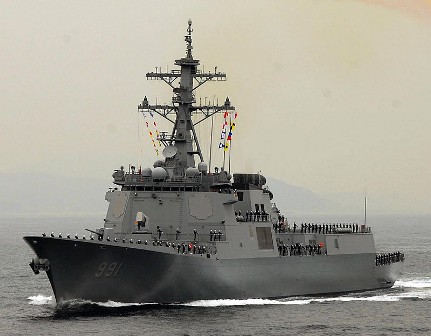Gwanggaeto the Great-class (KDX-1 Okpo)
Summary
| Origin country | 🇰🇷 South Korea |
| Category | Destroyer |
| Subtype | Helicopter destroyer |
| Manufacturer | Daewoo Heavy Industries Co., Okpo, Geoje |
| Year commissioned | 1998 |
| Units |
971 (광개토대왕 (廣開土大王)) Kwanggaeto the Great 972 (을지문덕 (乙支文德)) Ulchi Moonduk 973 (양만춘 (楊萬春)) Yang Manchoon |
| Current operators | 🇰🇷 South Korea |
Description
The Gwanggaeto the Great-class destroyers, also known as the KDX-I, represent a significant evolution of the Republic of Korea Navy (ROKN), shifting it from a coastal defense force to a blue-water navy. This class of destroyers/frigates undertook its initial mission to replace outdated US Navy ships transferred to South Korea in the 1950s and 1960s, marking a pivotal point in ROKN's history with enhanced power projection capabilities.
Originating from the need for modern naval assets, the first KDX-I ship's keel laying occurred in April 1994 after design studies. Constructed by Daewoo Heavy Industries Co., Inc. at Geoje, South Korea, these vessels signified a milestone in Korean shipbuilding, being the first 100% indigenously designed engineering undertaking by DSME.
The Gwanggaeto the Great class was designed with an armament suite tailored for multi-dimensional threats. Their primary anti-submarine weapon system is the Super Lynx helicopter, complemented by shipboard sensors. For close-in engagements, the ships are equipped with Mark 46 torpedoes. They feature RGM-84 Harpoon missiles and RIM-7P Sea Sparrow for anti-ship and anti-aircraft defense, respectively. Two 30mm Goalkeeper systems provide point defense against missiles and aircraft, while the main gun is an OTO Melara 127.
In terms of propulsion, two General Electric LM2500-30 gas turbines and SsangYong 20V 956 TB 82 diesel engines power the class, enabling a maximum speed of 30 knots, suitable for various operational needs.
The operational history of the class includes a series of upgrades to modernize the aging systems. As of 2021, a mid-life upgrade was implemented for all ships, focusing on replacing obsolete equipment with Hanwha Systems' combat management system, domestic Towed Array Sonar System, and LINK-16 integration, among other general overhauls.
The operating country of this class is primarily South Korea. However, the design has been further adapted by the Royal Thai Navy into the Bhumibol Adulyadej-class frigate, incorporating additional stealth features.
Technical specifications
| Displacement | 3900 tons |
| Range | 8000 km at 18 knots |
| Crew | 286 members |
| Width | 14.2 m (46.6 ft) |
| Length | 135.5 m (444.6 ft) |
| Air Park | 2 Super Lynx helicopters |
| Propulsion | 2 General Electric LM 2500 gas turbines with a power of 59,000 hp - 2 propellers |
| Armament | 8 UGM-84 (IV 2) + 1 VLS Mk.48 Sea Sparrow (XVI 1) + 2 Goalkeeper CIWS + 1 127mm OTO-Melara Compact gun + 6 T/ASM Mk.32 + 1 Super-Lynx helicopter |
| Maximum speed | 30 knots |
